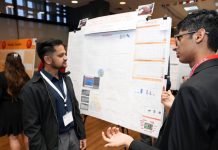A strong case can be made that physics was the defining scientific discipline of the 20th century. Nuclear power, wireless communication, spaceflight – the last century was characterised by these advances, and each was facilitated by our expanding understanding of the fundamental laws of the universe.
While the 20th century was exemplified by great strides in our grasp on the nature of reality, some have predicted that the 21st century could be defined by similarly dramatic improvements in our understanding of biology. Nowhere is this more apparent than in the field of genomics.
Just over 30 years ago, in 1990, a group of international scientists set out to map the human genome – one of the most ambitious scientific endeavours ever undertaken. 13 years and USD2.7 billion later (closer to USD6 billion in 2022), the Human Genome Project (HGP) was declared complete. Today, an individual can have their genome sequenced for roughly USD300 by BGI Group, just one of a number of genomics companies that are leading scientific discovery through genomics.
The potential impact of this change cannot be understated and underlines the power and importance of international scientific cooperation. In fact, without the combined knowledge and capability of institutions as diverse as the UK’s Wellcome Trust Sanger Institute, China’s Beijing Genomics Institute, the precursor to BGI Group, and the USA’s MIT Center for Genome Research, it is possible the HGP may never have been completed.
Moving towards personalisation
Modern medicine has, by and large, followed a one-size-fits-all approach. Patient characteristics such as weight, sex, age and family history of course play a part in diagnosis and treatment, but personalisation rarely extends beyond that point. The reason is straightforward enough; it simply has not been cost-effective to develop treatments on a case-by-case basis.
Even so, recent developments in genomics are increasingly making the identification and study of rare diseases possible.
Thalassemia is an inherited blood disorder which affects the amount of haemoglobin carried by red blood cells. Beta-thalassemia, which is the more severe variant of the condition, can cause anaemia, bone deformity and heart problems and affects 1.5 per cent of people globally.
While care options that can improve the lives of those affected by the disease do exist, screening, diagnosis and intervention in pre-marital, pre-pregnancy and prenatal populations offer the greatest chance at prevention. BGI is a global leader in thalassemia detection and produces genomics testing kits which are improving our ability to identify and treat the condition.
Genomic science is critical to making precision medicine and truly personalised medical solutions a reality. While each of us stands to benefit from bespoke medicine, those among us who live with rare genetic disorders could see their lives improved most dramatically.
There are approximately eight million children born with serious birth defects of a genetic or partially genetic origin each year. That translates to approximately six per cent of all births, meaning 1 in every 17 of us are affected by rare genetic disorders. These people often hold out only distant hope of accessing effective healthcare solutions. Their conditions can be unexplained and unnamed, leaving them feeling lost and isolated. A diagnosis, a name, even identification of a condition’s cause are all valuable and medically significant steps towards learning to live with an illness. Identification and diagnosis are also of course the first steps towards developing treatments and cures, making genomics a powerful tool in our medical arsenal.
The importance of international cooperation
The Human Genome Project taught us that international collaboration is an essential component of modern scientific study. The reality is that genomics and personalised medicine are unlikely to become widely available without cross-border collaboration to improve our understanding of the science and drive down costs.
Fostering cooperation between centres of excellence around the world will help to make genomic analysis routine and individual treatment of rare genetic diseases a reality, relieving human suffering in the process. Companies and organisations like BGI are already operating at the forefront of genomic science. Their work must continue if we are to realise the potential benefits the science promises.
It is a characteristic of scientific exploration that the real-world impact of a discovery may not be immediately clear. The advent of personalised medicine offers the possibility of developing treatments tailored to a patient’s DNA, a specific tumour or a specific virus. Given enough time, research, and investment, we could all be rare disease patients.
Disclaimer: This article contains sponsored marketing content. It is intended for promotional purposes and should not be considered as an endorsement or recommendation by our website. Readers are encouraged to conduct their own research and exercise their own judgment before making any decisions based on the information provided in this article.





































